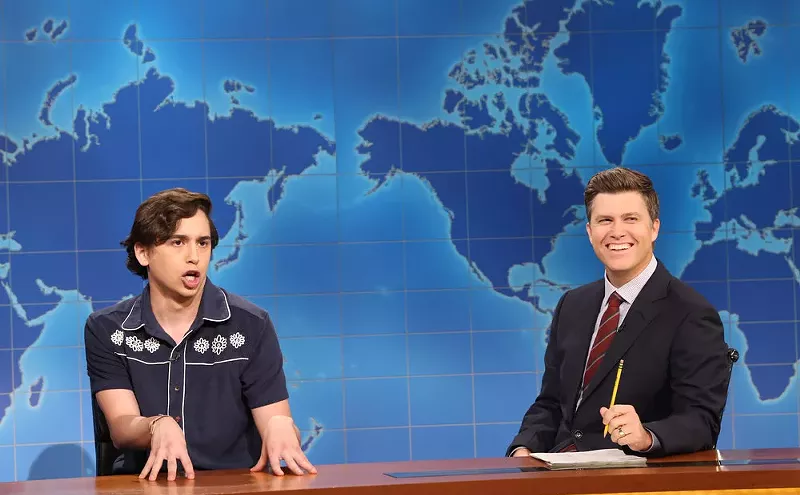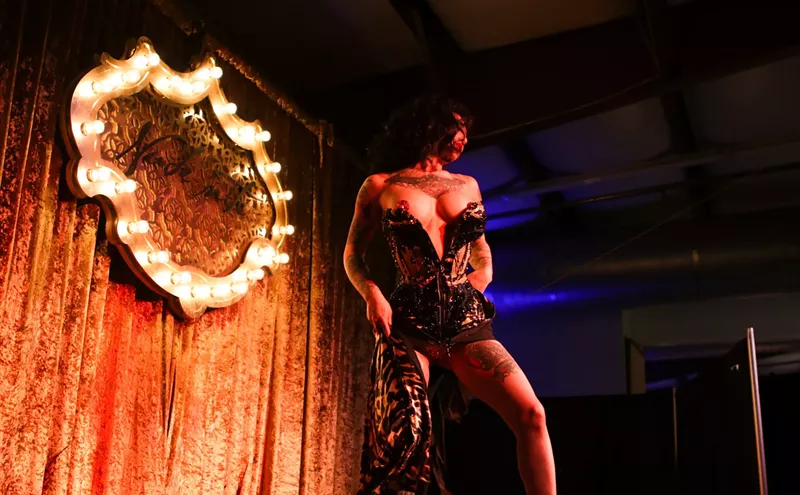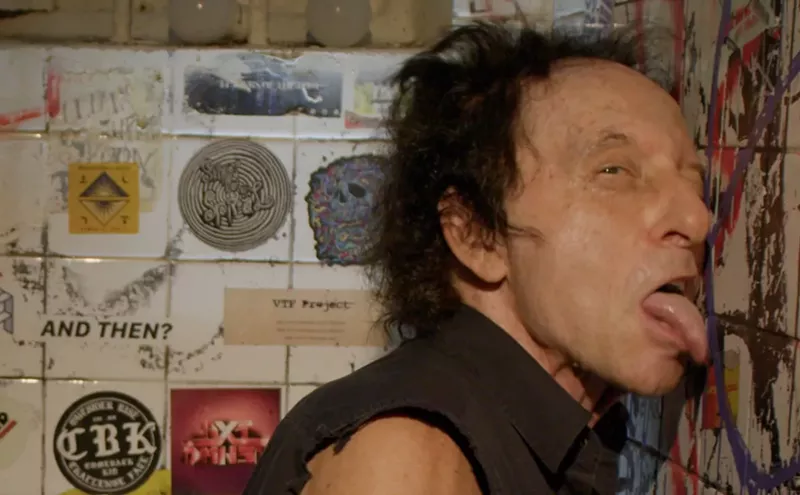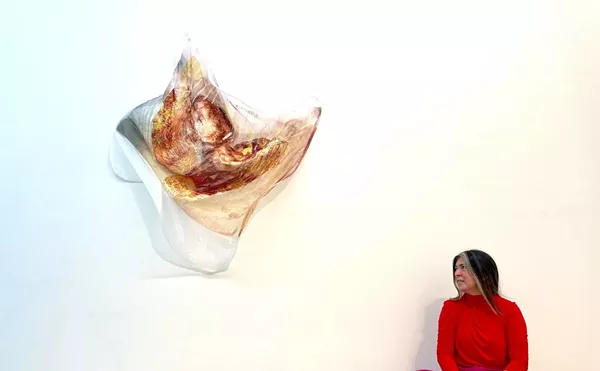Next month will mark one year since the death of journalist, polemicist and bon vivant Christopher Hitchens. Though the loss of the Hitch has been hard for his legion fans who fed lustily on his dispatches from around the world, few could have felt it more deeply than his best friend Martin Amis and his widow, Carol Blue. On Saturday at the Miami Book Fair International, they were joined by Hitchens' editor at Twelve Books, Cary Goldstein, to lead a joyful remembrance of Hitchens's life and work.
Amis, who was also at the fair with his latest novel, Lionel Asbo: State of England, led off with a story about Hitchens tangling with some well-dressed "upper class hippies" as the two attempted to enjoy dinner in 1975.
See also:
- Junot Diaz on Writing Men, Stories as Art, and Star Wars
- Naomi Wolfe's Vagina is All Up In Your Ladybusiness
"Christ!" Hitchens kept muttering as the hippies loudly made arrangements for a large party at what the two friends affectionately called "The Restaurant That's Only Big Enough for One Person." According to Amis, the hippies had "the air of young men who didn't work for living but were patiently waiting for the passing of elderly relatives."
It soon became clear that the hippies were going to ask Amis and Hitchens to vacate their seats. The hippies approached the table and one of them, "after a flirtatious pause, pouted through his fringe." This lead hippie spoke to Hitchens in a practiced way, as though this approach "had all gone like a dream before."
"You're going to hate us for this," the hippie said to Hitchens, "but -"
"We already do," Hitchens interrupted. The hippies scampered away and sent over "a terrified bottle of Valpolicella a half an hour later."
Though in his final years he may have been best known for his touchstone of atheism, God is Not Great, his columns for Vanity Fair, or his memoir, Hitch 22, he maintained a long career as a foreign correspondent, finding angles on stories untouched by writers far less courageous than he.
"I could literally tell you 50 stories," Blue recalled. "The Romanian revolution, what was then called Zaire, when he was in war zones or tricky situations and nearly lost his life."
That boldness and keen eye came to play even when his cancer prevented him from travel.
"When he became ill," she continued, "he traveled to this 'land of malady,' as he put it, and reported on it as a foreign correspondent."
Amis remembered how Hitchens went to Afghanistan in the months after the 9/11 terrorist attacks. Hitchens stopped at an outdoor market to buy half a dozen t-shirts with Osama bin Laden's face on them for friends. Just then, a mosque door opened and Hitchens was surrounded by 500 angry zealots and what Hitchens told Amis was "a foul atmosphere of fanatical arousal."
"You like Osama bin Laden?" they asked Hitchens. Amis guessed he himself would have sheepishly said, "Well, I quite like him..." Not the Hitch. Instead, the reply came, "Osama bin Laden is my brother."
"Your brother?"
"All men are my brothers," Hitchens said. "Now, if you'll excuse me..."
For all his wit, daring and devotion to causes (sometimes beyond the point of reason), according to Goldstein it was "the honesty in [Hitchens's work that] is inspiring to people." Goldstein went on to say that Hitchens perspective changed as his illness developed. "It became very visceral and physical writing as he became limited by his body."
Of this writing, newly collected in Mortality the posthumous essay collection that follows Hitchens's cancer ordeal, Blue said, "The book doesn't have a logical ending. He was going to write a different book with a different ending, was the hope."
He wrote until his last moments, finishing an essay on G.K. Chesterton from his hospital bed. (In his introduction of the panel, Herald book critic Ariel Gonzalez applied a description from Chesterton's novel The Man Who Was Thursday to describe Hitchens: he was "a blend of the angel and ape.")
All three panelists spoke of Hitchens's refusal to compromise as he fought his cancer. Amis recounted how "his sincere good manners were never abandoned... Sitting in his hellish hospital in Houston, with visitors coming in every 30 minutes, he never lost his grace."
This was the same friend with whom Amis used to frequent the "rough bars" of London and even when faced with "five very useful-looking men of no great education, he would never back down." Blue told of how, in later years, Hitchens ran out of their house to fight off a man he'd seen attacking a woman in the street and that this sort of thing happened all of the time.
Which is to say nothing of his legendary mind. As far as Amis is concerned, "he could beat Cicero plus Demosthenes in debate."
Goldstein repeated a story shared backstage by Mitch Kaplan of Books & Books, of a time when Hitchens came to Miami to debate not just one but five religious leaders on his God is Not Great book tour. After dismantling the arguments of the first four, Hitchens had only left a disabled doctor of Islamic thought. He announced to the crowd, "Surely you must be thinking he can't go after the woman in the wheelchair. But surely you would be wrong."
"He was loved," Amis said. "His terrific good looks had something to do with it." Hitchens himself, Amis continued, identified with Humbert Humbert's self-description in Lolita of his "striking if somewhat brutal good looks." Blue amended the description to "empire-building good looks."
Amis also attributed Hitchens's popularity to "the sense of danger" that surrounded him and how he "made intellection quite dramatic. Common sense was not his beat." Instead, Hitchens work was an exercise in deep personal exploration. "The Hitch was really debating with Christopher half the time," Amis said.
"For all the public pugilistic posturing he was known for," Goldstein offered, "he was a kind and appreciative writer."
He was also prolific. Hitchens was known for ducking out of a party in his home to go upstairs and write a 5,000 word essay and then returning while the party was still in full swing. In the days before email, Blue recalled, he would often write an essay within hours of receiving the assignment, only to "leave it on the fax machine to send in the morning so editors wouldn't know how fast he was."
Hitchens certainly crammed quite a bit of living into his 62 years. Amis takes comfort in this, adding on all the hours that Hitchens never slept because "he so loved life." To Amis, "He died at the age of 75."
"That cheers me up a bit," Blue said, "but what if he'd lived to 90?"
That love of life famously included a love of drink. "You had to think he was a different species," Amis said. When Amis would stagger home in a stupor, Hitchens would leave him to grind out another perfectly articulated piece. "He was not human, what he could do after such punishment."
Blue took pains to insist that Hitchens kept his prodigious drinking to a regimented schedule and that she had only ever seen him drunk "two or three times." Amis agreed, saying that "in over 40 years, I saw him drunk maybe twice."
Hitchens's writing was greatly admired by Amis, their close friend Ian McEwan and quite a few other novelists, many of whom would ask Amis why Hitchens never published any fiction.
"He had the phrasing and ability, he could dream himself into another person. He had the prerequisites." But McEwan surmised that Hitchens did not want to spend time "making things up."
"He wanted to write about Proust and who knows what else," Blue said. "He might have gotten to it."
"Fiction makes nothing happen," Amis disagreed. "Something goes seriously wrong when a novel interferes with the normal life."
Hitchens's was a singular voice now lamentably missing from public discourse. When Amis went to the Occupy Tampa protests during the Republican National Convention earlier this year, he asked himself, "Where is the Hitch in this movement?" He feels that what Hitchens had "has been bred out of American youth."
The two friends had a habit of seeking out "the most violent and horrifying movie available" and as Amis recalled of a trip to the Hamptons, they were "pathetically reduced to Wesley Snipes."
As they walked to the movie theater, Amis said, "No one's recognized you for ten minutes."
"It's been 15," Hitchens morosely said. "What do they know, what do they care, what do they feel if they don't recognize the Hitch?"
But back in front of that movie theater, Hitchens was at long last recognized by an American couple who asked him, of their fellow Americans, "Do you love us or do you hate us?"
Hitchens replied, "It all depends on how you behave." This, Amis said, "suggests a more logical person than he was."
Sometimes the quest for the mot juste would trump any opinions of his own. Take for instance another Amis story about Hitchens joining him on after Amis had lost a set of tennis 6-0 to author Robert Lifton. Lifton, about two decades older than Amis, was toweling off and "feeling very vigorous and manly." He boastfully spoke of the few true pleasures available to men: "There is sex, there is sport, there is art." Hitchens, not known for an embrace of sportif, replied, "And don't forget the languid contemplation of the misery of others."
Even so, "I always felt he had a superior love of life," Amis said. Blue added that she "respected it and slightly envied it."
Though he attributed some of the feeling to survivor guilt, Amis said that after his friend's death, "the world sort of tingled." He believes he has "a solemn and sacred duty" to enjoy life on behalf of Hitchens now.
Looking out at the packed crowd, easily one of the largest of the whole fair, Blue asked Amis what he thought Hitchens might make of this "lovefest."
"No more than it's due," Amis said.
Mortality, with an afterword by Carol Blue, and Lionel Asbo: State of England are in bookstores everywhere.
Follow Cultist on Facebook and Twitter @CultistMiami.












